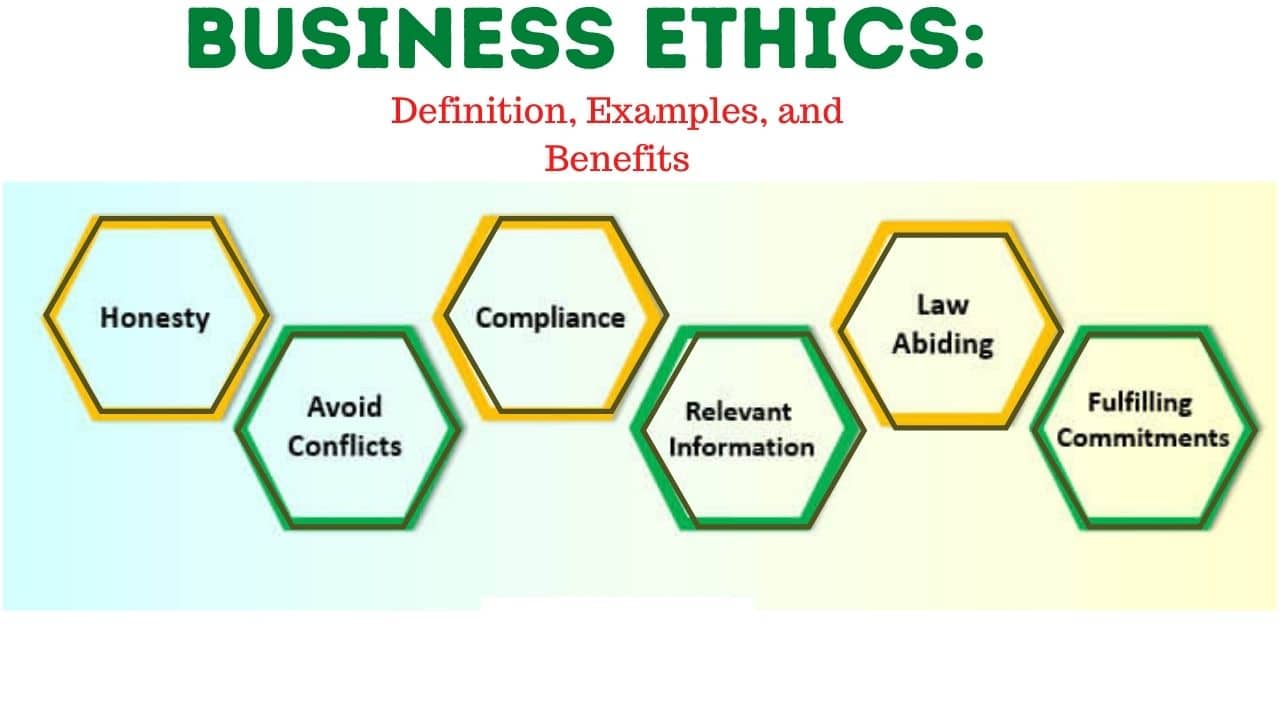Business ethics is an important practice in the corporate world. It changes how businesses and organizations operate and also influences legislation around corporate regulation.
This article seeks to inform you on what business ethics is, its impact on corporate society, and how you can spot ethical and unethical behaviors in the workplace.
What is Business Ethics?
A company’s actions are guided by a set of moral standards known as business ethics. These principles regulate all area of the company’s existence, including its interactions with the government and other enterprises, its treatment of employees, and its relationships with customers. Whenever ethical dilemmas or conflicts develop, a corporation will rely on these guiding principles to find a resolution.
What are the Benefits of Business Ethics?
Ethics are important to businesses as it helps them in so many ways:
- It provides a competitive advantage in terms of customers.
- Draws more investors toward the business.
- Enhance a company’s reputation.
- Retain good staff
- Build customer loyalty.
- It keeps the business from having any legal issues.
Why is Professional Ethics Important?
Professional ethics is significant because it establishes a set of norms for professionals to follow while dealing with the people with whom they work. From a philosophical standpoint, ethics is concerned with morality and how individuals conduct in terms of goodness or badness.
Types of Business Ethics
Business ethics have various components that govern how organizations and companies should operate. Some ways ethical behaviors can be practically applied are:
#1. Respect
Respect is an essential business value, both in how the business handles its clients, customers, and employees and in how its people respect one another. When you treat someone with respect, that person feels like a valued teammate or an important customer. You value their input, honor your commitments to them, and strive expeditiously to resolve any difficulties they may have.
#2. Trustworthiness and Solidarity
Trustworthiness involves transparency and honesty in all actions and communications. It also entails being loyal to positive impacts internally and externally. Customers appreciate openness, as it gives them insight into how a business operates.
#3. Personal Responsibility
Each employee, whether at the executive or entry-level level, will be expected to demonstrate personal accountability. This may involve accomplishing tasks assigned by your management or just carrying out the obligations outlined in your job description. If you make a mistake, you accept responsibility and do whatever is necessary to correct it.
#4. Fairness and Equality
When an organization is fair, it applies the same standards to all employees, regardless of their position. The same requirements of honesty, integrity, and accountability that apply to an entry-level employee also apply to the chief executive officer. The company will treat all of its clients with the same degree of courtesy and will supply the same goods and services under the same conditions.
#5. Caring and Dialogue
Ultimately, a company is made up of people. Some people consume goods and services from their businesses, while others work to create those goods and services. Being open to their struggle and coming to the table with a solution is a valuable tool any company can use.
Showing a sense of care and sticking to the lines of communication is not only ethically correct but can also promote awareness inside and outside the company.
#6. Corporate Responsibility
Businesses owe duties to their staff, clients or customers, and, in some instances, their boards of directors. Some of them may be contractual or legal duties, while others may be pledges, such as to conduct business honestly and to treat individuals with respect. Regardless of the nature of these commitments, the firm is obligated to fulfill them.
#7. Community Responsibility
Businesses will not only operate ethically with regard to their clients, customers, and workers, but also to the community and the environment. Numerous businesses seek to give back to their communities through volunteer labor and financial investments. Furthermore, they will implement waste reduction and environmental protection measures.
What are the Principles of Business Ethics?
11 principles of business ethics for executives:
- Fairness
- Honesty
- Integrity
- Promise-keeping
- Accountability
- Reputation and morale
- Respect for others
- Law-abiding
- Leadership
- Commitment to excellence
- Caring
Examples of Ethical Behavior in the Workplace
It’s essential to understand the basic principles of business ethics. It is more important to understand how these principles apply to your daily work. Here are some examples of how to apply ethical behavior.
#1. Customer Needs Come First
Companies that prioritize customer needs and adjust their workplace culture to hire employees to participate in this behavior participate in ethical behavior. For example, suppose a customer comes to the store looking for a product that meets their specific needs. In that case, rather than selling or encouraging them to buy a product that meets their needs, they can offer the best product for the situation described. Meanwhile, it is important to emphasize that a “customer first” attitude does not inadvertently lead to unethical treatment of employees.
READ ALSO: MARKETING DEPARTMENT: Overview, structure, roles, expectations
#2. Transparency
Transparency and clear communication are paramount when it comes to ethical behavior in the workplace. Employees and consumers should not lie or make false statements as they damage the trust in the company. For example, if a company is facing a public relations crisis, it needs to call a meeting to discuss the issue directly with its employees. It is essential to be honest about the developing situation, offer solutions, and humbly accept criticism.
#3. Prioritizing Work Diversity
Part of fairness is to give everyone equal opportunities to be employed by the company. There is much political debate about how to create fairness in the workplace, but it is undeniable that providing equal employment opportunities for all applicants is an ethical standard.
For example, if someone finds that management tends to hire the same type of person, they may suggest involving more employees in the hiring process. This introduces different perspectives into the hiring process and increases the likelihood that different types of applicants will be selected for positions.
#4. Respect Customer Information
Many companies collect personal information about their customers, regardless of payment or health information. The protection of this information should be a priority for any business. For example, hospitals may develop and implement proactive policies for employees who share patient information on social media. Sharing this type of information with personal accounts not only compromises patient privacy but also risks hospitals violating HIPAA regulations.
#5. Data Protection
Businesses routinely collect information about their clients. This may merely be an email address, but it could also include their actual address, or health or financial information, depending on the nature of the business. Companies that acquire consumer data generally claim to secure that information and not distribute it without the client’s permission. The same applies to employee information. Business ethics normally preserve employees’ personnel records and limit access only to those with a valid need to know.
#6. Whistleblower Protection
As a corporation expands, it becomes more difficult to ensure that personnel adhere to the company’s ethical standards. Occasionally, the firm will rely on a whistleblower to bring attention to unethical company activities. To encourage employees to disclose unethical practices, firms frequently implement safeguards against adverse repercussions. With these safeguards, employees need not fear losing their employment or face disciplinary action for reporting unethical conduct.
#7. Providing Resources for Reporting Unethical Behavior
When employees become aware of unethical behavior in the workplace, they need a way to report that behavior. The company is responsible for setting up this infrastructure and designing it to protect its employees from harm.
For instance, a research university needs a neutral compliance office that is systematically separated from the institution’s research department. This provides a neutral space for scholars to report unethical research and harmful practices without fear of affecting the workplace.
It is the vestibule Fringilla and frames a kind of sense of fairness and justice and the key system. There are no ethical reasons, don’t just decide what kind of behavior is manipulative, but rather
Some Unethical Behavior in the Workplace includes the following:
- Lying
- Taking Sides in an Employee Argument
- Misusing Company Time
- Cultivating a Hostile Workplace
- Ignoring Conflicts of Interest
Effects of Unethical Behavior in the Workplace
Poor ethical decisions can affect a company in the following ways.
- Legal Issues: Companies that do not ethically violate the law can face heavy fines and other penalties.
- Poor Employee Performance: A lack of ethics within a company affects the way employees do their jobs. People can choose that the leaders can do the same because they will break the rules. This can lead to damage to the company. You may also be discouraged or frustrated to realize the need to work hard in an unethical environment.
- Poor company credibility: When a company is unethical, it hurts its reputation. Managers and companies not only lose the respect of their employees but also their credibility to the public. This can lead to declining sales, loss of customers, and significant financial damage.
Read Also: ETHICAL INVESTING: Definition, Types, Pros, and Cons
Why Is Business Ethics Important?
First and foremost, business ethics ensure that the organization complies with all applicable regulations. Operating lawfully, whether on a local or national scale, preserves the company’s standing with its peers and potential clients or consumers and enables it to continue operations.
The business ethics of a corporation may aid in attracting quality staff. Attractive to job searchers are companies that care for their employees at every level and treat them with the greatest ethical standards. Additionally, if you work for a company that respects its employees, you are more likely to perform well and remain with the organization for an extended period of time.
A firm that serves its consumers or clients ethically develops trust and a lasting relationship with them. These clients will be loyal, and they will likely suggest the company to those inside their sphere of influence. A business that is known for its strong ethical standards can also win respect and improve its reputation.
How to Implement Good Business Ethics
It takes time and effort to create an atmosphere in which ethical behavior and decision-making are encouraged, and this process must always begin at the top. In order to ensure employees behave ethically, the vast majority of businesses need to have a code of ethics or conduct, guiding principles, reporting mechanisms, and training programs.
Once behavior is outlined and initiatives are put into place, maintaining open lines of communication with staff becomes critically important. Leaders should continuously urge employees to disclose concerning behavior, and there should be assurances that whistle-blowers will not face adversarial consequences if they do so. This is especially important for organizations that are subject to government regulations.
Wrapping Up
Any person in a position of authority has a responsibility to set an example of ethical behavior for others under their supervision. In order to gain trust and provide genuine goods and services, businesses must adopt more moral practices.
Business Ethics FAQs
What are the 7 business ethics?
(i) Politics without Principles (ii) Wealth without Work (iii) Commerce without Morality (iv) Knowledge without Character (v) Pleasure without Conscience (vi) Science without Humanity (vii) Worship without Sacrifice.
What is business ethics and example?
An example of business ethics is when moral rules are applied by a corporation to determine how best to treat its employees, shareholders, and customers. An example of business ethics is accounting ethics – especially for accountants of publicly-held corporations – which depend upon complete honesty and transparency.
What are the 3 C's of business ethics?
collaboration, comprehension and communication.
- Business Ethics Definition: pros and cons to managers [case study
- ORGANIZATIONAL ETHICS: How To Design Organizational Ethics and Behaviour
- ETHICAL INVESTING: Definition, Types, Pros, and Cons
- Social Marketing Strategy: Definition & Examples
- VEGAN CLOTHING BRANDS: Top 19+ Picks You Can’t Ignore in 2023






